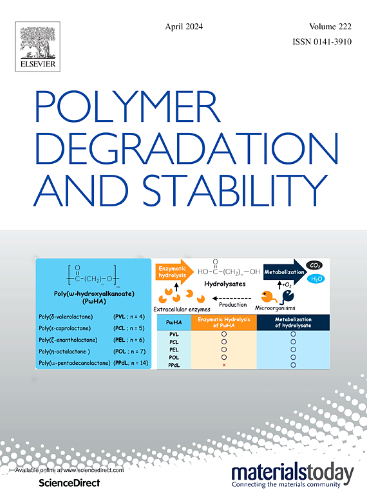Degradation behavior of polybutylene succinate with fillers
IF 6.3
2区 化学
Q1 POLYMER SCIENCE
引用次数: 0
Abstract
The degradation profiles of poly(butylene succinate) (PBS) with filler were quantitatively evaluated with respect to the degradation rate and the effect of filler content. The types of fillers examined were activated carbon (AC), mesoporous silica, and cellulose nanofiber. Compost degradation and temperature-elevated hydrolysis were performed, and the rate of molecular weight reduction was found to be independent of filler type and content. The ISO 14,855–1 protocol showed no effect of microbial degradation on the molecular weight change profile but did reveal degradation by hydrolysis. The low filler content did not affect the crystallinity or polydispersity index, which suggests that the degradation proceeded uniformly in the crystalline and amorphous phases. However, the crystallinity was lower when the content was high, and the weight decreased at a higher rate. These results suggest that crystallization was inhibited by AC during sample molding, thus promoted the elution of low-molecular-weight components, which were stuck in crystalline regime, from amorphous regime. No AC discharge was observed during temperature-elevated hydrolysis, which was quantitatively confirmed by carbon balance analysis. This finding suggested that the hydrolysis rate of PBS around the AC was very small. The kinetic analysis of the molecular weight change profile of PBS was conducted, and the activation energy of degradation was determined to be 73 kJ/mol. The parameters determined in this study enable the prediction of the time change in the molecular weight of PBS resulting from hydrolysis.
求助全文
约1分钟内获得全文
求助全文
来源期刊

Polymer Degradation and Stability
化学-高分子科学
CiteScore
10.10
自引率
10.20%
发文量
325
审稿时长
23 days
期刊介绍:
Polymer Degradation and Stability deals with the degradation reactions and their control which are a major preoccupation of practitioners of the many and diverse aspects of modern polymer technology.
Deteriorative reactions occur during processing, when polymers are subjected to heat, oxygen and mechanical stress, and during the useful life of the materials when oxygen and sunlight are the most important degradative agencies. In more specialised applications, degradation may be induced by high energy radiation, ozone, atmospheric pollutants, mechanical stress, biological action, hydrolysis and many other influences. The mechanisms of these reactions and stabilisation processes must be understood if the technology and application of polymers are to continue to advance. The reporting of investigations of this kind is therefore a major function of this journal.
However there are also new developments in polymer technology in which degradation processes find positive applications. For example, photodegradable plastics are now available, the recycling of polymeric products will become increasingly important, degradation and combustion studies are involved in the definition of the fire hazards which are associated with polymeric materials and the microelectronics industry is vitally dependent upon polymer degradation in the manufacture of its circuitry. Polymer properties may also be improved by processes like curing and grafting, the chemistry of which can be closely related to that which causes physical deterioration in other circumstances.
 求助内容:
求助内容: 应助结果提醒方式:
应助结果提醒方式:


